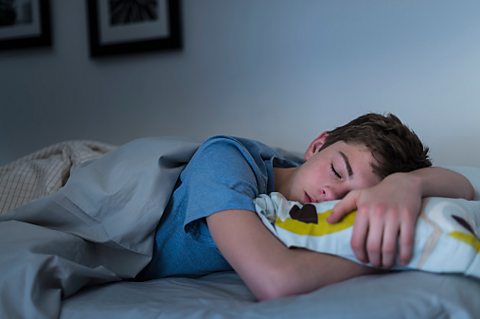Why do stressful situations affect our dreams? - BBC Bitesize (original) (raw)
This article was last updated on 23 March 2021
Have you noticed more strange dreams than usual over the past year?
Throughout 2020 and into 2021, lots of people have found sleeping a bit more challenging. Against the backdrop of a global pandemic and multiple lockdowns, sleeping patterns have been impacted and there has also been a rise in strange, and sometimes unpleasant dreams.
A study carried out by the University of Southampton in 2020 found that sleep loss caused by worrying increased from one in six to one in four at the height of the pandemic last year, while Finnish research published in October showed that 55% of bad dreams were related to Covid-19.
But why is it that stressful situations can take over our night times? BBC Bitesize spoke to psychologist Professor Mark Blagrove from Swansea University to find out how and why real life plays a part in our dreams.
Lockdown dreaming
First of all – when do we dream?
Our brains enter different cycles throughout the various stages of sleep. The stages vary in length and reflect how deep our sleep is.
Dreaming typically occurs in the Rapid Eye Movement (REM) phase. We spend around a quarter of our sleep in REM – a phase that is very active and similar to being awake in many ways.
One of the consequences of lockdowns has been a change in routine – for many of us, mornings have completely changed as we have spent more time at home, not needing to wake up early to travel to school or work. This has meant some people have spent longer asleep and in turn, has led to an increased amount of REM sleep.

Image caption,
A 2011 study in the United States found that dreams could be used as a form of overnight therapy - preparing us for stressful situations with a dry run.
Prof Blagrove explains one of the reasons dreams could be more emotional at the moment is “all the distress people feel when being cooped up at home”, particularly if being with people we wouldn’t usually be spending all this time with is putting a strain on those relationships.
He said: “Some people say that dreams are caused by us processing emotions, memories and events in our sleep. Other people say that they are a bit like a daydream which produces interesting short films about your waking life.
What dreams mean
There have been plenty of conflicting opinions through the years about just how much our dreams reflect our daily lives.
This debate goes as far back as 1900 when Sigmund Freud published his highly influential book The Interpretation of Dreams. Freud argued that our dreams are a collection of images from our daily lives which are symbolic and have a meaning. To him, dreams reflect our unconscious thoughts.
But other theorists have argued that dreams allow our mind to rehearse situations and plan possible responses. According to this argument, called the ‘Primitive Instinct Rehearsal Theory’, our bad dreams allow us to think of ways we would protect ourselves from danger in real life.
One of the theories suggests our dreams enable us to heal and process situations in our lives. In 2011, scientists at the University of California, Berkeley in the United States argued that dreams help to reduce stress and anxiety in people’s lives. They saw dreams as a form of overnight therapy.
The Berkeley team found that during the REM stage of sleep, we have fewer stress neurotransmitters (which send chemical messages to our body and cause us to feel stressed). Therefore, dreaming during REM teaches our mind to think about difficult situations without feeling stressed.
As the study was published, Matthew Walker, one of the Berkeley scientists, said: “The dream stage of sleep, based on its unique neurochemical composition, provides us with a soothing balm that removes the sharp edges from the prior day’s emotional experiences.”
Broken routines
According to Prof Blagrove, the strange dreams people have been experiencing over the past year may be a result of the stress caused by the pandemic and from having our daily schedules disrupted.
“People may be having more emotional home lives and various stresses such as being worried about their job. That would make the dream stranger and more memorable.”

Image caption,
Improving your bedtime routine - and limiting screen time before you go to sleep - can reduce the chance of a stressful dream.
When you're a child, unpleasant dreams tend to start when you're between three and six years old. These dreams remain frequent until the age of 10, when we would usually grow out of them as a regular habit – although the occasional nightmare could still happen to any of us.
One of the most common triggers for nightmares and unusual dreams we have in our teenage years is exams at school, college or university. Similar to the pandemic, exams are intensely stressful situations from our day-to-day lives that can make their way into dreams.
How to process these dreams
Prof Blagrove said: “Dreams depict our waking lives in a really quite poetic and metaphorical way, but you're often not in control of the story that the dream is producing.”
He recommends talking to other people about difficult dreams. Not only could it help provide some comfort but identifying any repeating patterns or stressful themes could help us to try to tackle them in our waking life, where possible.
Another way to reduce stress and try to prevent these dreams from reoccurring is to create a healthy bedtime routine - which can calm us down and ensure we get enough hours of sleep.
Healthy routines can include performing deep breathing exercises, talking about our feelings with trusted people and avoiding anything which energises our brains or causes anxiety, such as using mobile phones or watching the news before bed.

If you need support
You should always tell someone about the things you’re worried about. You can tell a friend, parent, guardian, teacher, or another trusted adult. If you're struggling with your mental health, going to your GP can be a good place to start to find help. Your GP can let you know what support is available to you, suggest different types of treatment and offer regular check-ups to see how you’re doing.
If you’re in need of in-the-moment support you can contact Childline, where you can speak to a counsellor. Their lines are open 24 hours a day, 7 days a week.
There are more links to helpful organisations on BBC Action Line.
